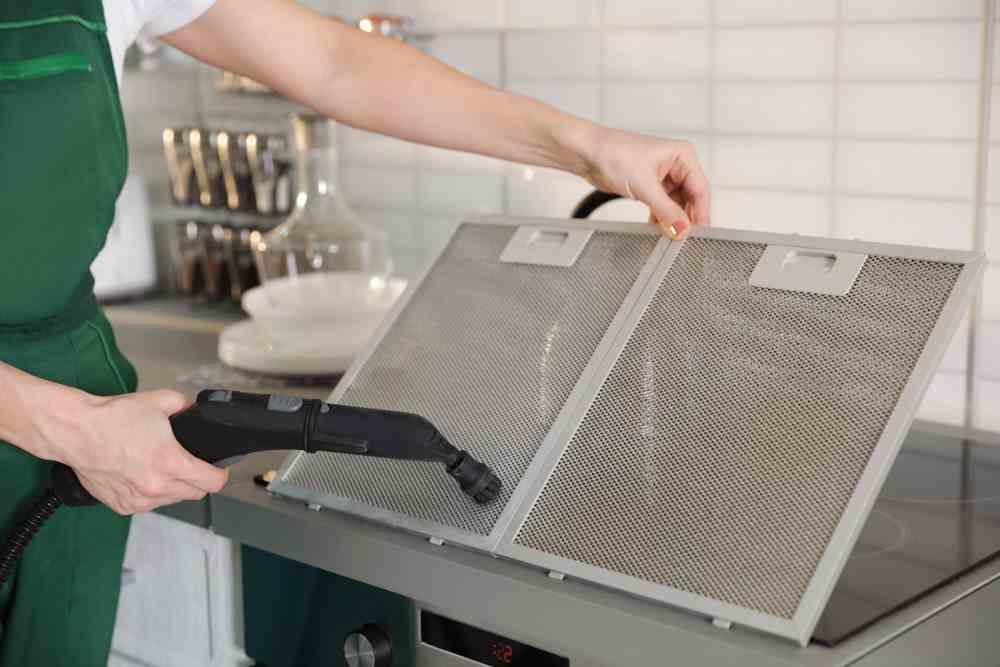Grease Fire Mitigation through Kitchen Exhaust Cleaning

Grease fires are a common and dangerous occurrence in commercial kitchens. These fires can quickly escalate, causing significant damage to property and posing a serious threat to the safety of employees and customers. One effective way to mitigate the risk of grease fires is through regular kitchen exhaust cleaning. In this article, we will explore the importance of kitchen exhaust cleaning, its benefits, and how it can help prevent grease fires.
Ontario-wide Kitchen Exhaust and Hood Cleaning – Best prices and service guaranteed.
The Dangers of Grease Fires
Grease fires are a result of the ignition of flammable cooking oils and fats. They can occur when oil or grease becomes too hot and reaches its ignition point. Once ignited, these fires can spread rapidly, fueled by the grease and other combustible materials present in the kitchen.
Grease fires pose several dangers:
- Rapid spread: Grease fires can quickly spread to other areas of the kitchen, including walls, ceilings, and equipment. This can lead to extensive damage and make it difficult for occupants to escape.
- Smoke and toxic fumes: When grease burns, it produces thick smoke and toxic fumes. Inhaling these fumes can cause respiratory problems and other health issues.
- Explosions: In some cases, grease fires can lead to explosions if they come into contact with flammable substances, such as gas or chemicals.
The Importance of Kitchen Exhaust Cleaning
Kitchen exhaust systems play a crucial role in removing smoke, heat, and grease particles from the air. However, over time, these systems can become clogged with grease, reducing their efficiency and increasing the risk of grease fires. Regular kitchen exhaust cleaning is essential to maintain the effectiveness of these systems and ensure a safe working environment.
Ontario-wide Kitchen Exhaust and Hood Cleaning – Best prices and service guaranteed.
Here are some key reasons why kitchen exhaust cleaning is important:
- Fire prevention: By removing grease buildup from the exhaust system, the risk of grease fires is significantly reduced. Regular cleaning helps eliminate the fuel source for fires, making the kitchen a safer place.
- Improved air quality: A clean kitchen exhaust system ensures that smoke, odors, and harmful particles are properly removed from the air. This helps maintain a healthy and comfortable environment for employees and customers.
- Compliance with regulations: Many jurisdictions have specific regulations and codes regarding kitchen exhaust cleaning. Failure to comply with these regulations can result in fines, penalties, and even closure of the establishment.
- Extended equipment lifespan: Grease buildup in the exhaust system can also affect the performance and lifespan of kitchen equipment, such as fans and motors. Regular cleaning helps prevent costly repairs and replacements.
The Process of Kitchen Exhaust Cleaning
Kitchen exhaust cleaning involves a thorough cleaning of the entire exhaust system, including the hood, filters, ductwork, and exhaust fan. It is a specialized task that requires the expertise of trained professionals. Here is an overview of the typical process:
Ontario-wide Kitchen Exhaust and Hood Cleaning – Best prices and service guaranteed.
- Inspection: A professional technician will inspect the entire exhaust system to assess the level of grease buildup and identify any potential issues.
- Preparation: The technician will cover and protect surrounding areas to prevent any mess or damage during the cleaning process.
- Disassembly: The hood, filters, and other removable components of the exhaust system are carefully removed for thorough cleaning.
- Cleaning: The technician will use specialized tools and cleaning agents to remove grease and other contaminants from the hood, filters, ductwork, and exhaust fan.
- Reassembly: Once the cleaning is complete, all components are reassembled, ensuring proper alignment and functionality.
- Final inspection: The technician will conduct a final inspection to ensure that the exhaust system is clean, free from any obstructions, and functioning properly.
Case Studies and Statistics
Ontario-wide Kitchen Exhaust and Hood Cleaning – Best prices and service guaranteed.
Several case studies and statistics highlight the importance of kitchen exhaust cleaning in preventing grease fires:
Case Study 1: In a study conducted by the National Fire Protection Association (NFPA), it was found that failure to clean the kitchen exhaust system was the leading factor contributing to the ignition of grease fires in commercial kitchens.
Case Study 2: A restaurant in a busy urban area experienced a grease fire that quickly spread to neighboring buildings. The fire caused extensive damage and resulted in the closure of several businesses. Investigation revealed that the restaurant had neglected regular kitchen exhaust cleaning, leading to a buildup of grease in the exhaust system.
Statistics:
- According to the NFPA, an average of 8,000 restaurant fires are reported each year in the United States, resulting in an estimated $246 million in property damage.
- A study by the International Kitchen Exhaust Cleaning Association (IKECA) found that 59% of restaurant fires were caused by cooking equipment, with grease fires being the most common type.
- The IKECA also reported that 22% of restaurant fires spread beyond the kitchen, causing significant damage to the building and endangering occupants.
Ontario-wide Kitchen Exhaust and Hood Cleaning – Best prices and service guaranteed.
Kitchen exhaust cleaning is a critical aspect of grease fire mitigation in commercial kitchens. By regularly cleaning the exhaust system, the risk of grease fires is significantly reduced, ensuring the safety of employees, customers, and property. Additionally, kitchen exhaust cleaning improves air quality, extends equipment lifespan, and helps establishments comply with regulations. The case studies and statistics mentioned in this article highlight the real-world impact of neglecting kitchen exhaust cleaning. It is essential for restaurant owners and managers to prioritize regular cleaning to create a safe and healthy environment in their kitchens.
Learn more about “Grease Fire Prevention and Kitchen Exhaust Cleaning” here.
Frequently Asked Questions about Grease Fire Mitigation through Kitchen Exhaust Cleaning

How Does Regular Exhaust Cleaning Reduce the Risk of Grease Fires?
Grease and particulate matter from cooking accumulate in your exhaust system over time. When these deposits reach a certain thickness, they can become a severe fire hazard. A well-maintained and clean exhaust system significantly reduces the chance of these particles igniting. The cleaning process removes layers of grease, leaving the surfaces down to the bare metal, which substantially minimizes the risk of a fire starting within the exhaust system. In essence, no fuel, no fire!
What Are the Standards for Kitchen Exhaust Cleaning to Mitigate Grease Fires?
The National Fire Protection Association (NFPA) sets the standards for kitchen exhaust cleaning, specifically in the NFPA 96 document. According to these guidelines, exhaust systems should be inspected at regular intervals, ranging from monthly for systems serving solid-fuel cooking operations to annually for systems serving low-volume cooking establishments. The cleaning must be performed by trained, qualified professionals who can remove combustible contaminants down to the bare metal. Following these standards is crucial for effectively mitigating the risk of grease fires.
Are There Any Indicators to Warn Me Before a Potential Grease Fire?
Yes, several signs can alert you to a high risk of grease fire:
Excessive smoke during cooking, even at low or moderate heat
Strong, pungent odors that don’t dissipate after cooking
Grease or grime visibly dripping from exhaust hoods or filters
Decreased airflow, leading to a stuffy, hot kitchen environment If you notice any of these signs, it’s crucial to schedule a professional exhaust system cleaning as soon as possible.
Can I Use Regular Detergents for Exhaust Cleaning to Prevent Grease Fires?
While regular detergents might remove some surface grease and grime, they’re not sufficient for removing the thick, often carbonized grease deposits that can accumulate in exhaust systems. This requires specialized degreasers and techniques such as hot water pressure washing or scraping down to the bare metal. Amateur cleaning methods often leave behind grease that can become a fire hazard. Always consult a certified kitchen exhaust specialist for this task.
What Should Be My Immediate Steps if a Grease Fire Occurs in the Kitchen?
Immediate action is crucial in case of a grease fire:
Call 911 right away, even if you think you can control the fire.
Do NOT pour water on a grease fire; it can cause the grease to splatter and spread the fire.
If safe to do so, use a Class K fire extinguisher aimed at the base of the flames.
Use a metal lid to cover and smother small grease fires in pans.
Evacuate the premises immediately if the fire begins to spread.
Knowing how to react during a grease fire can save lives and prevent further property damage.
To sum up, the cleaning and maintenance of your kitchen exhaust system are not just regulatory requirements but also critical preventative measures against grease fires. Remember, a clean exhaust is a safer exhaust. Always adhere to professional cleaning standards and schedules to ensure the safety of your kitchen.
- Grease Fire Mitigation through Kitchen Exhaust Cleaning
- hood cleaning
- kitchen exhaust cleaning
- restaurant hood cleaning






